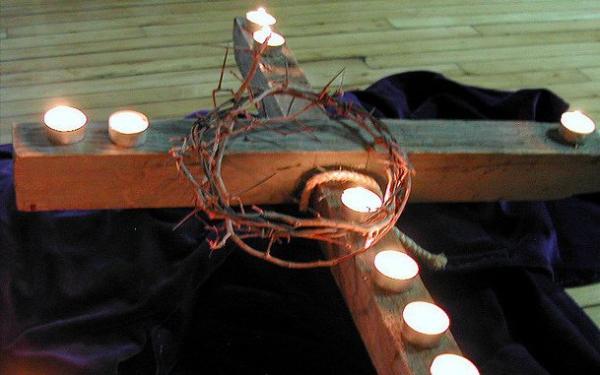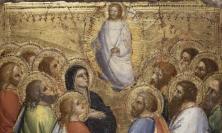Through our liturgies over the coming days, we will observe the Passion, death and Resurrection of Christ. Peter Knott SJ describes how the events of Good Friday, Holy Saturday and Easter Sunday form a narrative which helps us to make sense of our own lives, particularly our disappointments and failings. ‘The risen Christ remains an abiding reality, ever with us even in our own Good Friday.’
Among the first words we tend to learn as children are: ‘It’s not fair.’ There is a connection between what Jesus tasted on Good Friday and what any person who is treated unfairly tastes. We have our own Good Fridays and they are not unconnected to what happened on Calvary two thousand years ago. Indeed, what Jesus underwent on Good Friday is what gives us dignity when we taste the darkness of humiliation, loneliness, helplessness, and death.
What did Jesus undergo on Good Friday? Interestingly, the gospels do not focus on his physical sufferings. What they highlight is his emotional suffering and his humiliation. He is presented as lonely, betrayed, helpless to explain himself, a victim of jealousy, mocked, misunderstood, stripped naked so as to feel embarrassment and shame; and yet inside of all this, as clinging to warmth, goodness and forgiveness. Good Friday is when darkness has its hour. (Luke 22.53)
There are times when we can all experience Good Fridays, and something of what Christ felt: whenever we find ourselves on a sick bed alone, knowing that we face disability or disfigurement, or maybe even death – when we are alone inside of fear: whenever we find ourselves alone inside a duty, whenever we are seen as too timid, too frigid, too afraid to pick up our own lives – when innocence and duty are seen as a weakness; whenever we experience the pain of being unable to express ourselves, when we feel the pain that comes from knowing that most of what is best inside us will die with us seemingly wasted; whenever we find ourselves the object of jealousy, animosity, and threat because of what we believe in – when what is virtue in us is made to look like selfishness, when we are made to feel shame for what we believe in, when what is precious to us is deemed offensive to others; whenever we find ourselves alone and lost, before ageing, before the loss of health, before the loss of attractiveness and our former place in life, and before the loss of life itself.
When we taste such bitterness there is little else to say other than what Jesus said when he was led away from Gethsemane to humiliation and death: ‘But this is your hour, and the power of darkness.’ (Luke 22.53) We know what that means. All of us have moments when our world falls apart and when all we can do is bite the dust and wait.
Wait for what? Wait for darkness and death to have their hour. As Matthew says in his Passion account, wait for the curtain of the temple to be torn from top to bottom, and the earth to shake, and the rocks to split open, and the graves to open and to show themselves to be empty. (Matthew 27: 51-52)
It seemed like the end at the time, but the disaster of Friday eventually gives way to the joy of Easter Sunday; the risen Christ remains an abiding reality, ever with us even in our own Good Friday.
Holy Saturday provides a vital link between Friday and Sunday. Its emptiness makes us look beyond the senses towards God alone. There is nothing we can do, but something God can do silently, imperceptibly in us, helping us to understand better the mystery of Divine love, giving new meaning and purpose to life.
Easter Sunday reveals the joyous transformation of the risen Christ. The Resurrection celebrates Christ’s life: it also celebrates that same Life hidden within us. This explains the meaning of our lives, as Christ explained to his disciples on the road to Emmaus. (Luke 24:13)
Superficially our lives appear to be a jumble of disasters and success, tears and joy. At times we are alive with a huge appetite for life; at others life seems empty with little to live for. What are we to make of the endless contradictions that seem to rule our lives?
The joyous truth of Easter is that Christ embraced the many contradictions that sin has brought into our lives. On the cross he died for all of us and for all that has died within us – our many hidden deaths, brought about by our own weakness and the disappointed hopes of a broken world. Those hidden deaths, when they remain alone, lead only to despair. When they become one with Christ’s death they become life itself. Christ, lifted up on the cross, raised to new life, has the power to transform the contradictions of our lives.
Good Friday left the disciples desolate. There seemed so little to live for now. Their memories lay buried with Jesus in the tomb. When disaster hits, we too can begin to live life with little expectation of ourselves or the world in which we live. Without realising it we can bury the best of ourselves beneath the routine of daily life.
At first the disciples couldn’t reach beyond the darkness of Good Friday and the weakness it had revealed in them. We also may find ourselves living in the darkness of past failures. When we truly understand the resurrection, we let go of what might have been, and accept gratefully what Christ is actually doing in our lives.
St Paul describes us as those who have been brought back to true life in Christ (Romans 6:4). We carry within ourselves that same Risen Lord who so transformed the lives of those first disciples.
We must realise for ourselves the power of this Risen Lord dwelling within us, helping us to cope with the disappointments we all experience in different ways: misunderstanding, unfair criticism, a love that faded, a love betrayed, hopes that were lost, times when it was hard to face the truth – about ourselves, about others.
A world struggling to cope with distress and division cries out for a new beginning. The Risen Lord, at work in our hearts offers that new life to all of us, rising above frustrations and heartaches.
We can never say that life has parted us from Christ, that he is lost to us, that we do not know where to find him. He lives hidden in our hearts. There is everything to live for
Good Friday, Holy Saturday and Easter Sunday each has a distinctive ‘note.’ We have to keep these notes together as one chord. Only when the notes are brought into harmony can we ‘hear’ what the composer is offering us – the fullness of life. We pray that all may share this joy every day, forever.
This life is a preparation for eternity, and there will be many surprises awaiting us in heaven. But one of the nicer surprises may be to find that all our heartaches were simply growing pains.
Peter Knott SJ is Chaplain to Barlborough Hall School and the author of the weekly reflection, GodTalk.






